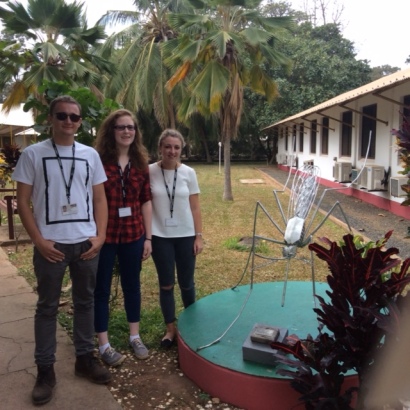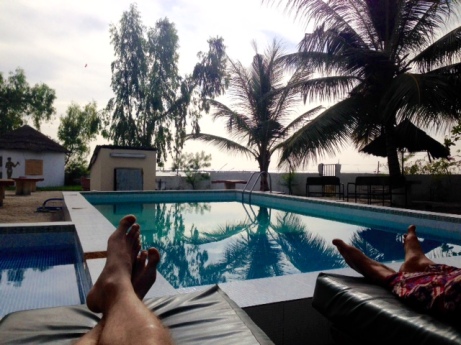Hi guys, my name is Declan and I am a Pharmacology student at The University of Manchester. I’m writing this post to give everybody back home, prospective placement students in particular, a bit of a description of my placement with The MRC Unit in The Gambia. Here, I’m undertaking an immunology-based project examining the potential for Gambians to exhibit protective immunity to Mycobacterium tuberculosis (TB). I’ve been working here for around eight months now, and haven’t seen rain in about six! Anyways, I’ll try to give you all a rundown of what’s involved in a placement year with The MRC, what it’s like working in an international lab / in the field of immunology and what life is like in The Gambia.
We all received our offer letters sometime during revision for 2nd semester exams, so to say it all came as a bit overwhelming would be an understatement. After meeting my future housemates, Rowan and Claire, the university helped us with organizing all of our vaccinations and other medical preparations for travelling abroad to The Gambia in July 2015. When we left it was difficult for anybody to predict exactly how we would find the experience. We had very little idea what The MRC, or the country, would be like, but students from previous years spoke very highly of it and were happy to lessen our apprehensions. On arrival, everything was laid out for us, and we soon settled into a lovely house on-site for the three of us. Within a few weeks, training sessions were completed and we were ready to begin work for our projects!

Myself, Claire and Rowan
The prospect of travelling to work on a disease as well-characterised as TB at a renowned research station was overwhelming – How could I catch up with centuries of research and somehow contribute to it?! However, I’ve found that once you get working on a project where you’re focusing all your attention on one subject (as I’m certainly doing here), it really helps you to digest the information and make real progress. My work is almost entirely concerned with my own project. It’s very rare that I’m required to devote time to any other work than my own, and I’m given a great degree of autonomy in the way I choose to work, which I adore – I couldn’t really ask for more. Work hours are about 8 hours per day, with a half day on Fridays, and a fair few public holidays. Anyways, I can try to describe what I do in my time in the lab here for anyone who’s interested:
Samples are taken from Gambians living with individuals with active pulmonary TB. This is conducted by the TB Immunology department’s sample collection team, who we’re always welcome to join on trips to various regions of The Gambia. These samples are used for a bunch of different projects in our department, but mine are concerned with comparing those who contract, with those who don’t contract, latent TB disease. The idea with this is to see what differences there are in the individuals’ innate immune systems that protect them from initial TB infection, before an adaptive immune response is even primed. The project is divided into three main lab phases. Firstly, I carry out assays for interferon γ, a routine protocol in our lab. This diagnoses whether a patient has latent TB infection. After this, I carried out a similar type of assay (multiplex cytokine assays, for anybody interested) looking at levels of a load of other cytokines, all implicated in TB in some way. Finally, we run flow cytometry experiments using isolated white blood cellsrozen in liquid nitrogen – super cool). This means we get to compare cytokine levels, then cell populations, then the cytokine production from those cells. It all sounds a bit complicated… It kind of is. Flow cytometry is a super complicated technique and hugely valuable if you want to work in immunology, or just want to show in your CV that you’re competent at difficult lab techniques.
The amount of data that we’ve generated has already been immense – it’s no wonder so many students end up publishing quality research papers at the end of their time here. An important thing I’d say about working in the field of immunology is that it all comes down to the analysis. You can spend weeks/months running samples without even seeing a hint of a trend, then it all comes together when you compare all of your data. I have amassed so much data that I could decide to analyse it in one of a thousand different ways. It sounds incredibly geeky, and maybe it is, but there’s nothing more satisfying than seeing months of data collection go into stats analysis and seeing something significant come out of the other side.
There’s so much more to draw from the experience of living and working here that I think I’ll struggle to write it all down. I think that working internationally really helps you to gain a sense of independence which is hugely beneficial to your confidence, vastly impacting your ability to work well as an individual. Also, it’s worth considering the importance of being able to work in a team of people from different cultural and linguistic backgrounds. At The MRC, everybody speaks English to varying degrees, but you’ll regularly hear people speaking French, Dutch, German, Wolof, Mandinka, Fula, Krio, Ibo, and a range of other languages depending on who’s in town at the time! It’s a really exciting educational experience for anybody who likes to learn about new languages and cultures. I’ve definitely been able to develop my communication skills during my time here, as I have taken the opportunity to learn some Wolof, a very useful local language in this part of The Gambia, and in a lot of West Africa in general. I couldn’t recommend this enough as it opens up so many more opportunities to explore. With MRC sites all over the country and plenty of other friends travelling around on weekends and holidays, there’s no shortage of hidden gems to visit where it’s possible to get a true “Gambian Experience” (cringe) in less touristy parts of the country.

Kuntakinteh
Sandy beaches stretching on for miles are about a 5 minute walk away from The MRC. We’re spoilt for wildlife, really – it’s possible to pose for photos with crocodiles in the sacred pools at Bakau, go bird-watching on the river from Tendaba or Lamin and watch the hippos from Basse town. You can take a 20-minute bike ride to the see the Senegambia monkey park, though I haven’t done this, since you can oftentimes wait in The MRC for the local monkey families to come and steal the oranges growing in the garden (cute!). If you’re feeling adventurous, a short journey north into Senegal takes you to safari parks featuring lions, giraffes, rhinos and a host of other wildlife. On that note, Senegal offers numerous great short trips outside of work. We visited Dindefelo Falls (awesome), plan to attend the St. Louis jazz festival, and know plenty of other people who have travelled into other areas of Senegal, Guinea and Guinea-Bissau.
Scroll over photos to view captions:
Another fantastic thing about working in The Gambia is the tiny size of the country. This gives you so many opportunities to meet people who you would never get to meet working in other countries. During our time here, we’ve hung out with numerous US Marine and Peace Corps, spent a lot of time with students from all over Europe, working not just in The MRC, but at clinics, hospitals and other organisations all around the country. If you’re lucky, you may get the opportunity to meet the ambassadors for the US and the UK – they’re actually pretty sound to have a cup of tea with. Basically, I’d say to any prospective applicants for projects based here, don’t be worried about being away from your friends in Manchester. There’s a pretty cool bunch of people here, people who I’m sure I’m going to miss just as much when I return to England as I’ve been missing all my university friends for the last eight months.
To summarise, working in The Gambia is pretty sweet. If I could pick anywhere to start getting an idea of what full-time research work is like, I’d certainly choose it to be somewhere sunny, with ample opportunities to relax away from work. This place certainly seems to provide that. In short, I almost don’t want to come back!
Thanks for reading, and if anybody wants to contact me to ask about placement years, The MRC, immunological research or The Gambia, feel free to drop me a message at declan.manning@student.manchester.ac.uk. I’ll always try to respond as quickly as possible!
Declan.




